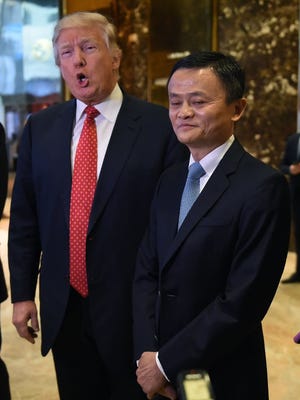Donald Trump: 'Great meeting' with Alibaba's Jack Ma

SAN FRANCISCO —Alibaba executive chairman Jack Ma met with president-elect Donald Trump on Monday to discuss Ma's plans to create 1 million U.S. jobs by growing trade between U.S. small businesses and Chinese consumers.
"It was a great meeting," Trump told reporters at Trump Tower. He also called Ma "a great entrepreneur, one of the best in the world."
"He loves this country and he also loves China," Trump said. "Jack and I are going to do some great things."
Monday's meeting, which came amid growing tensions between China and the incoming Trump administration, focused on the Chinese technology giant's plans to expand in the U.S., especially the Midwest, and strengthening relationships between China and the U.S., according to Ma.
An editorial in Chinese state media this month warned Trump that he risked "big sticks" if he starts a trade war with China.
"There are flowers around the gate of China’s Ministry of Commerce, but there are also big sticks hidden inside the door — they both await Americans,” the Communist Party’s Global Times newspaper wrote in the editorial responding to the appointment of Robert Lighthizer as U.S. trade representative. Lighthizer is a former trade official in the Ronald Reagan administration who has criticized China on trade. Trump also named Peter Navarro, a UC Irvine economics professor and China trade critic to run a White House National Trade Council.
"It was a very productive meeting," Ma told reporters. "The door is open to discuss the relationship on trade issues."
Ma specifically mentioned agricultural products such as wine and fruit that could be sold through Alibaba to consumers in China and Asia.
Details of the plan are vague. Alibaba spokesman Robert Christie declined to comment.
Alibaba had previously positioned China as a massive market for American goods that could create U.S. jobs, but had not pegged how many U.S. jobs it thought that its expansion would create.
Last year Ma said he envisions 40% of Alibaba's business to be outside China in the next 10 years.
"$BABA wants to create US jobs by helping US small businesses and farmers sell to China's 300 million-strong middle class," Alibaba tweeted Monday.
Alibaba sale nets $17.8 billion in 24 hours
Ma first outlined the expansion plans in a Wall Street Journal editorial in June 2015. Alibaba aspires to be the digital platform through which all international retailers gain access to Chinese consumers. Alibaba controls about 80% of China’s online shopping market with marketplaces such as Taobao and T-Mall.
"We want to help U.S entrepreneurs, small business owners, and brands and companies of all sizes sell their goods to the growing Chinese consumer class. Chinese consumers will get to buy the American products they want. This, in turn, will help create American jobs and increase U.S. exports," Ma wrote at the time.
Alibaba IPO: Jack Ma's scrappy start-up takes on U.S.
On the campaign trail, Trump pledged to limit global trade, taking aim at China. Steep tariffs on Chinese goods could undercut Alibaba's AliExpress service which lets Chinese retailers sell to U.S. consumers and U.S. brands to sell to Chinese consumers. Alibaba last month was placed back on a list of counterfeit marketplaces by the United States Trade Representative over sales on its Taobao marketplace of fake and pirated goods, a move that could also dampen international sales.
"The purpose of Jack Ma’s visit was to frame Alibaba’s business with the U.S. in a framework Donald Trump understands, as an innovative company that is creating jobs for both Chinese and Americans," Scott Kennedy, director of the Project on Chinese Business & Political Economy at the Center for Strategic & International Studies, said in an email. "Alibaba’s future, in part, will depend on expanding international trade and limiting protectionism and reducing trade barriers is in its deep self-interest."
Alibaba has benefited from constraints on foreign companies in China, Kennedy said.
"My guess is that Alibaba wants to highlight how it is different from Chinese state-owned enterprises in steel and other traditional sectors, areas that appear the Trump administration is most likely to target for sanctions as part of its effort to open up China’s markets further to U.S. goods and investment," he said. "However, Alibaba’s situation is actually more complex than the contrast it aims to highlight."
Trump: SoftBank to add $50B, 50K jobs in U.S.
Ma is not the first Asian entrepreneur to appeal to Trump with the promise of U.S. jobs.
SoftBank CEO Masayoshi Son, a Japanese billionaire and technology investor who backed Alibaba, met with Trump last month.
Softbank said at the time that it plans to invest $50 billion into the U.S. economy, and add 50,000 jobs. The Japanese company has a majority stake in Sprint, whose plans to merge with rival T-Mobile were thwarted by the Obama Administration. Son did not say what specific investments SoftBank would make but they were part of a previously announced $100 billion tech investment fund.
"Masa said he would never do this had we (Trump) not won the election!" Trump tweeted after the meeting.